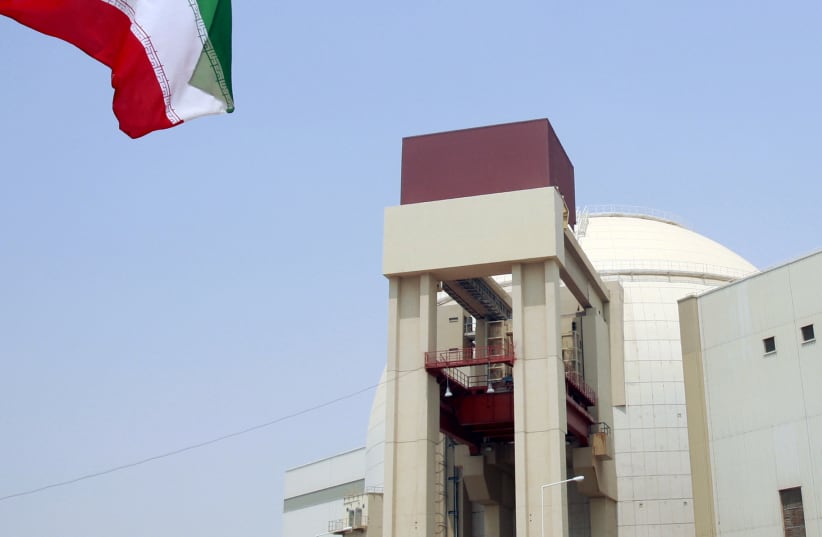Iran is taking advantage of the lull in nuclear talks with the US to get dangerously close to a nuclear weapon, and there must be a deadline to return to negotiations, Israeli officials have warned their American counterparts.
Prime Minister Naftali Bennett, Foreign Minister Yair Lapid, Defense Minister Benny Gantz and Justice Minister Gideon Sa’ar have brought the matter up with their American counterparts, as well as in the European states party to the Iran deal, the UK, France and Germany, a senior source in Jerusalem said.
The ministers have asked what the Western states plan to do to prevent Iran from getting a nuclear weapon now that it is closer to one than ever before.
Tehran has said it will not return to talks at least until after President-elect Ebrahim Raisi is inaugurated on August 5, nearly two months after the end of the sixth round of indirect negotiations between the US and Iran in Vienna, which are intended to restore the 2015 Joint Comprehensive Plan of Action.
Israel is concerned that Iran is using the “state of limbo,” as a senior diplomatic source called it, to reduce its breakout time for a nuclear weapon from about seven to two or three months while the International Atomic Energy Agency is not able to inspect the situation.
Then Iran could return to the negotiating table, having already achieved what it wanted on the nuclear front, while still demanding that the US lift sanctions, the source said.
Iran was endangering the chance of concluding an accord with world powers over reviving its 2015 nuclear deal if it did not return to the negotiating table soon, the French Foreign Ministry said Monday.
“If it continues on this path, not only will it continue to delay when an agreement to lift sanctions can be reached, but it risks jeopardizing the very possibility of concluding the Vienna talks and restoring the JCPOA,” or Joint Comprehensive Plan of Action, Foreign Ministry spokeswoman Agnes von der Muhll told reporters in a daily briefing.
Last week, IAEA Director-General Rafael Grossi said Iran’s announcement that talks will be on hold until Raisi enters office “leaves us in a rather uncomfortable position.”
“We still have a number of questions, issues that we are trying to clarify with Iran, and we will have to wait and start anew with the new team when they are in office,” he told AFP.
Earlier this month, Iran told the IAEA it has taken steps to produce uranium metal enriched to 20% for use as reactor fuel. This brings Iran’s nuclear project to a more advanced stage than any country without nuclear weapons is known to have reached.
Prime Minister Naftali Bennett blamed opposition leader Benjamin Netanyahu for the advances in Iran’s nuclear program soon after news of its uranium enrichment was published.
Netanyahu was “prime minister for 12 years, up until a month ago, and his neglect was what allowed Iran to reach the most advanced point ever in its nuclear program… This is the inheritance Bennett received, and from here, he will navigate and fix it with all the tools he has,” a source in the Prime Minister’s Office said.
Rob Malley, the lead US negotiator with Iran, on Sunday confirmed Iranian statements that the Biden administration is prepared to lift all sanctions on the Islamic Republic.
Asked if the US should lift sanctions first, he told MSNBC: “That deal has been more or less on the table,” and he cited statements by senior Iranian officials on the matter.
“If Iran wanted to see the sanctions lifted, it could have had them lifted in March, in April, May, June or July,” Malley said. “At all of those stages, the US offered [to do so]... in exchange for Iran coming into compliance” with the JCPOA.
US President Joe Biden “said very clearly that we’re prepared to come back to the deal if they’re prepared to do their part,” he said. “In other words, we’ll lift the sanctions if they’re prepared to come back into compliance with the nuclear constraints and obligations they signed up to in 2015.”
Malley criticized former US president Donald Trump for leaving the nuclear deal in 2018 and applying heavy sanctions on Iran.
“Three years on, I think the verdict is clear that America is less safe because Iran has a more expansive, clear program and because it has accelerated and intensified its regional activities – the very steps the Trump administration said it would tackle through its maximum pressure,” he said.
Iran is not only demanding the removal of sanctions; it seeks to include a clause in the new nuclear deal that would require the US to get UN approval before leaving the agreement again, The Wall Street Journal reported. That likely would be unconstitutional in the US, where a president cannot bind a future president or the Congress to a policy.
Jordan’s King Abdullah II gave a vague answer when asked by CNN on Sunday if he supported the Biden administration’s push to rejoin the 2015 Iran nuclear deal.
“There are legitimate concerns in our part of the world on a lot of portfolios that the Americans are hopefully going to be able to discuss with the Iranians,” Abdullah said, including issues of specific concern for Jordan.
“The nuclear program affects Israel as it does the Gulf,” he said, adding that the American and Iranian positions in the Vienna talks are “somewhat far apart.”
Abdullah cited efforts by the United Arab Emirates, Kuwait and Saudi Arabia to engage with Iran to lower tensions.
“Let’s hope that those talks get us to a better position where we can calm the region, because we have so many challenges,” he added.
Reuters and Tzvi Joffre contributed to this report.
